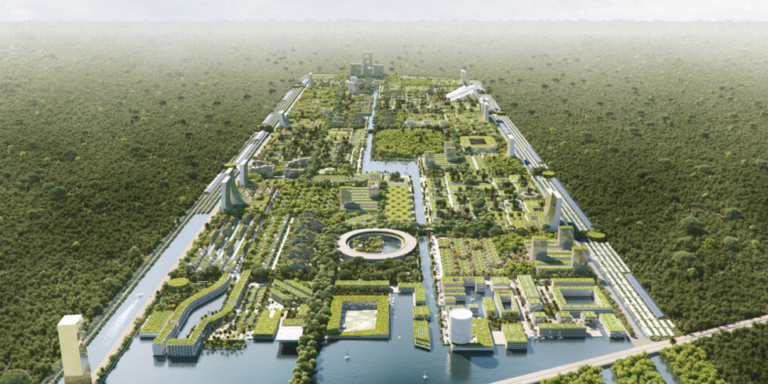Nestled on the white sands of Mexico’s Yucatan Peninsula, Cancun appeals to several kinds of travelers. Families, honeymooners and “spring-breakers” from North America typically flock there for its its world-class beach resorts, Mayan ruins and hedonistic nightlife.
But futuristic plans are underway to diversify Cancun’s offering, by building a sustainable smart city alongside it that helps mitigate some of the damage cities do to the natural environment, and that will help find solutions to the planet’s most pressing climate change problems.
“Urban forestry” is the signature of Italian architect and urban planner Stefano Boeri. His firm, Stefano Boeri Architetti (SBA), is known for creating city-center “vertical forests” – high-rise towers with staggered balconies overhanging with vegetation – in metropolises such as Milan, Shanghai, Cairo and Chicago.
SBA states: “An increase in the number of forests and trees with the use of a CO2 fertilizer will drastically reduce pollution, energy consumption and the urban heat island effect, increasing biodiversity of living species and making cities safer, more pleasant, healthier and attractive.”
Amazing high-speed low pass by Greek F-16s over Kastellorizo (video)
Now, Boeri’s architectural practice is taking things a step further with plans to build an entire forest city concept from scratch. Cancun Smart Forest City, as it will be called, will cover more than 1,376 acres of land.
The ambitious project will be “a botanical garden within a contemporary city”, built on a site that was originally set aside for a shopping center. Instead, Cancun Smart Forest City will be an epicenter of cutting-edge research into sustainability, and an eco-friendly utopia dreamed into life.
Incorporating Boeri’s talent for urban forestry, the ratio of plants to people in this smart city will be almost equal – with 362 hectares of planted surfaces (think parks, living façades and green roofs) in addition to a population of 130,000 humans. In total there will be about 7.5 million plants including 260,000 trees.
Read more: Globe Trender
Ask me anything
Explore related questions




